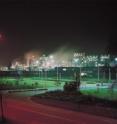Light is the friend of lovers
The increase of artificial night lighting is only one of the consequences of intense urbanization. There is no doubt that chemical and noise pollution can have a strong impact on ecosystems. To date, however, the more subtle consequences of light pollution on wild populations of animals have not received enough attention. Scientists of the Max Planck Institute for Ornithology have now shown that permanent night lighting alters the reproductive behaviour of birds. In those habitats that are affected by artificial light, males started to sing earlier and females advanced the onset of breeding activities. Moreover, males occupying territories with street lights had a higher number of extra-pair mates than males living in dark forests. (Published in Current Biology September 16, 2010) Artificial light at night has fatal consequences for many nocturnal animals. Millions of insects, for example, die each year through the attraction to street lamps. Migratory birds get distracted by artificial night light, and consequently, go astray and even crash into illuminated high-rise buildings. Although artificial light has not always such fatal impact, it nevertheless can have a substantial influence on an animal's life. This problem was investigated by Bart Kempenaers and colleagues from the Max Planck Institute for Ornithology in Seewiesen in five species of songbirds. They studied the effect of street lighting at the outskirts of forest habitat on the song behaviour of male birds. Indeed, males from four out of five species started to sing earlier in the morning than males that lived in locations without artificial night light. This effect was most pronounced for those species known to engage in early dawn singing. For example, male robins living near street lights started singing on average 80 minutes earlier than their conspecifics sleeping in the dark.
The researchers were not only interested in the relationship between night lighting and song behaviour but also whether artificial light explicitly influenced the bird's reproductive behaviour. Over seven consecutive years they monitored breeding activities in a population of blue tits. Those females that lived near artificial light started egg-laying on average one and a half days earlier than females in territories without street lights or in central forest territories. "Females that start to lay earlier usually produce more eggs. They are often in a better physical condition than those that start laying later in the season", explains Bart Kempenaers, director in Seewiesen. "However, females that advance breeding due to the artificial light do not, overall, lay more eggs". Earlier egg laying could be disadvantageous for the offspring if they hatch outside the peak of food availability.
Light influences the number of extra-pair partners with whom males sire offspring
Artificial night lighting also has a strong effect on the reproductive success of male blue tits: The scientists found that males living in forest outskirts exposed to street lights were twice as successful in obtaining extra-pair mates than their neighbours in the darker areas within the forest. This effect was most pronounced in yearling males that are usually not very successful in siring extra-pair offspring. Under the influence of artificial light, those males sired almost as many extra-pair offspring as older males in dark habitats. "Most likely early dawn song represents a signal for the females to estimate male quality", argues Bart Kempenaers. Thus, light pollution potentially leads to maladaptive mate-choice decisions in relation to the quality of extra-pair partners. However, whether the early singing, the early egg laying and the altered extra-pair mating behaviour have consequences for survival and fitness of the adults and their offspring remains to be investigated.
